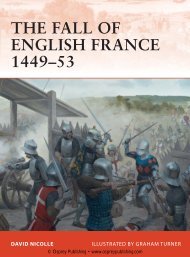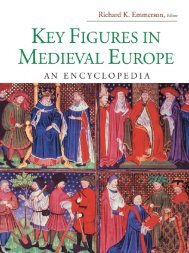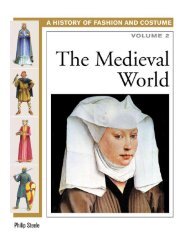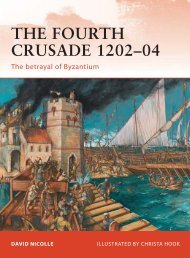Osprey - General Military - Knight - The Warrior and ... - Brego-weard
Osprey - General Military - Knight - The Warrior and ... - Brego-weard
Osprey - General Military - Knight - The Warrior and ... - Brego-weard
You also want an ePaper? Increase the reach of your titles
YUMPU automatically turns print PDFs into web optimized ePapers that Google loves.
It is the relationship between the knight <strong>and</strong> his lord that acts as the catalyst for the<br />
epic tales. Rol<strong>and</strong>'s death was brought about by the treachery of his uncle Ganelon,<br />
whom Charlemagne had pulled apart by horses for the deed. Rol<strong>and</strong>'s companion<br />
Oliver stayed beside his friend to the death. According to Geoffrey de Villehardouin,<br />
Louis de Bethune refused to leave the field in spite ol his wounds, with the words<br />
'God lorbid that I should ever be reproached with flying from the field <strong>and</strong> ab<strong>and</strong>oning<br />
my emperor.' A most poignant example of loyalty to one's lord occurred at Crecy. King<br />
John of Bohemia, allied to the King of France, served with him at the battle. Although<br />
he had lost his sight some ten years earlier he insisted on taking the field <strong>and</strong> had his<br />
retinue lead him into the thick ol the battle that he might strike a blow with his sword.<br />
In order that they would not be separated from him in the press his 12 companions tied<br />
all of their reins together. During the battle all were slain, <strong>and</strong> Froissart tells us that<br />
the next day they were found in the place about the king, <strong>and</strong> all their horses tied<br />
each to other'.<br />
Loyalty <strong>and</strong> duty was a two-way thing. Just as the knight had a duty to serve his<br />
lord, so his lord had a duty to defend <strong>and</strong> support his knights both on the field <strong>and</strong> in<br />
general. A lord was expected to be generous to his followers, rewarding their loyalty<br />
with gilts. A lord's failure to protect or provide for his knights was as great a cause of<br />
shame as a vassal failing his lord. In the 12th-century epic tales Rao ill de Cambrai<strong>and</strong><br />
Girart of Vienne, a perception ol tailure led to resistance, rebellion, war <strong>and</strong> suffering.<br />
In Raoul it was King Louis' deprivation of the eponymous anti-hero's rightful<br />
inheritance <strong>and</strong> his subsequent failure to grant him a promised fief, that forced Raoul<br />
to undertake armed rebellion. In Girart of Vienne it was Charlemagne's refusal to<br />
punish his queen for shaming his man Girart in front of the court that breached the<br />
ties between vassal <strong>and</strong> lord <strong>and</strong> triggered the seven-year siege of Vienne. It was not<br />
just in the romances that such splits took place. Before the battle of Evesham both<br />
sides pronounced the diffidatio, the formal renunciation of the tie of lord <strong>and</strong> vassal.<br />
<strong>The</strong> warrior ethos can be seen in the earliest chivalric writings <strong>and</strong> behaviour, <strong>and</strong><br />
formed a central core around which other str<strong>and</strong>s developed. <strong>The</strong> origins of these<br />
martial values tend to be ascribed to the warrior culture of the Germanic tribes who<br />
settled in Western Europe at the collapse of the Roman Empire, <strong>and</strong> it is true that<br />
these same virtues are lauded in the surviving literature ol Saxon Engl<strong>and</strong>, Viking<br />
Sc<strong>and</strong>inavia <strong>and</strong> Carohngian France. <strong>The</strong> Song of Ataldon, a poem describing the battle<br />
between the tenth-century Ealdorman ol Essex Brihtnoth <strong>and</strong> a Viking army,<br />
describes the lord as a 'giver of rings' <strong>and</strong> 'the people's chief, Aetheldred's earl'. It ends<br />
with Brihtnoth's death, after which his warriors, fighting to the death, 'all desired one<br />
of two things, to lose their lives or to avenge the one they loved'. Beowulf, of a similar<br />
date <strong>and</strong> origin, has similar themes of prowess, loyalty <strong>and</strong> service. <strong>The</strong>se similarities<br />
CHIVALRY: THE KNIGHTLY CODE -







